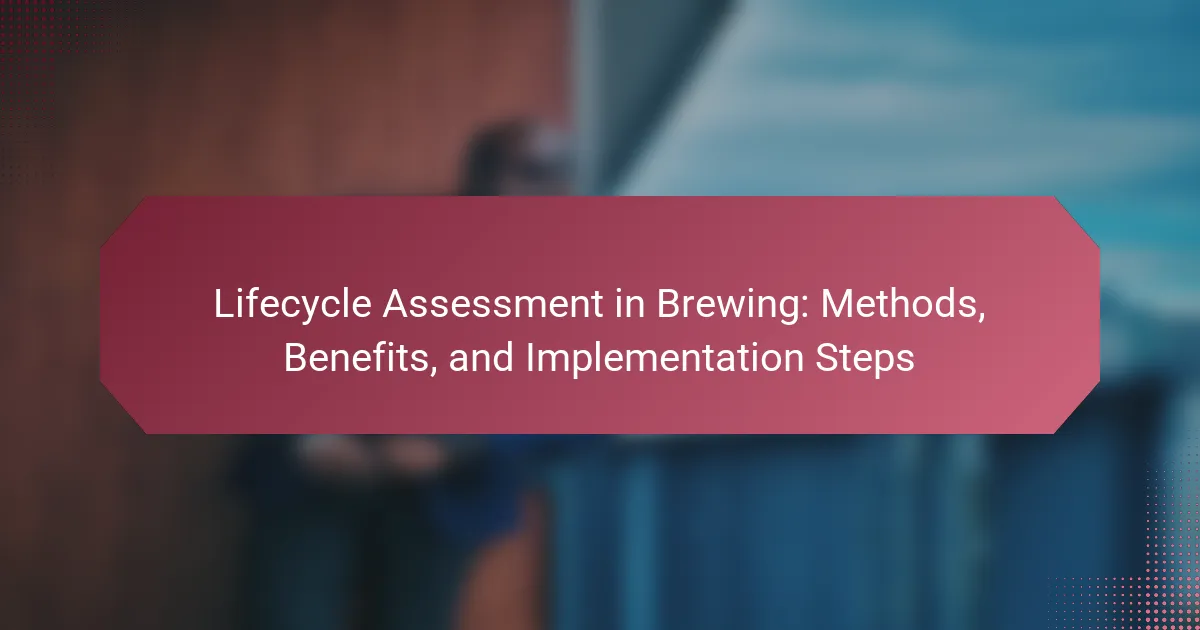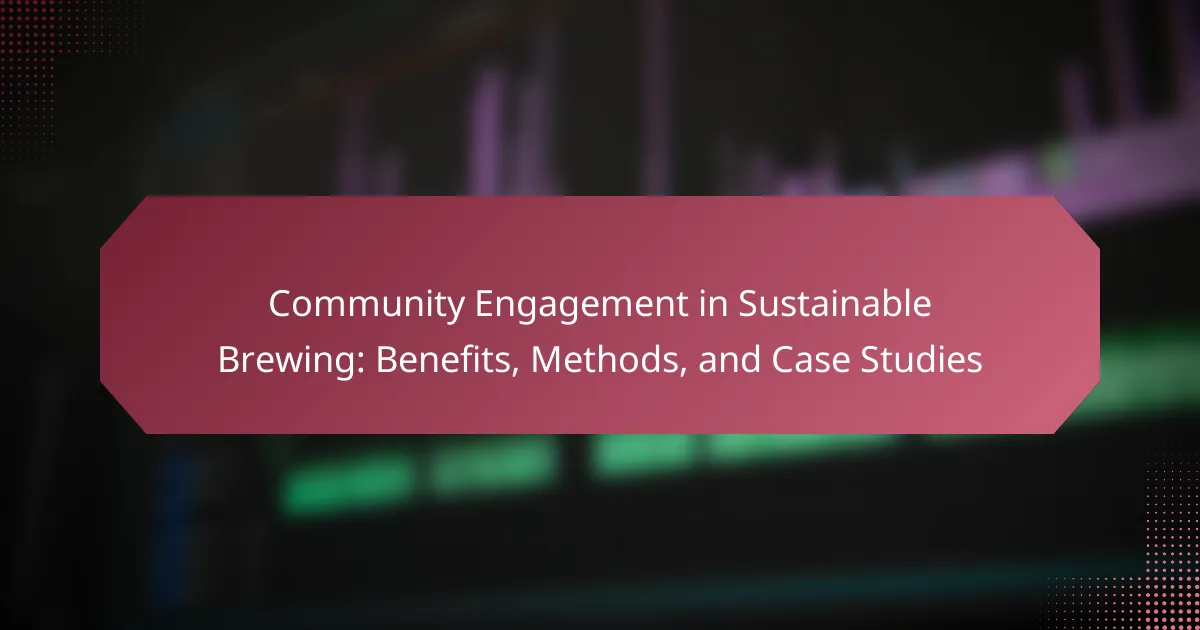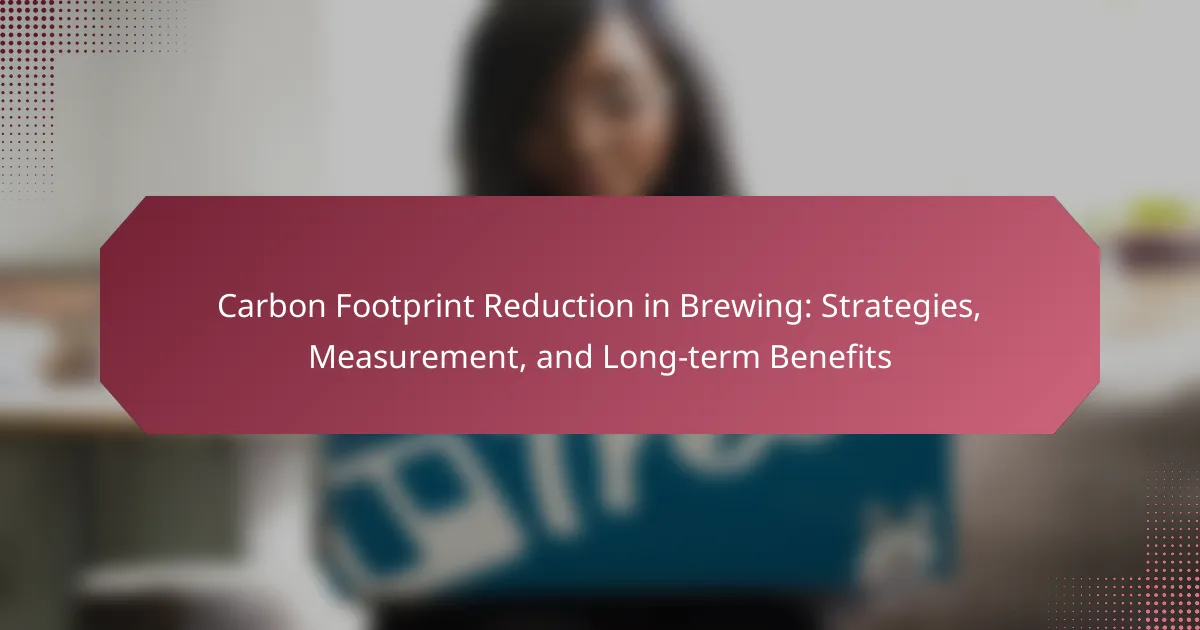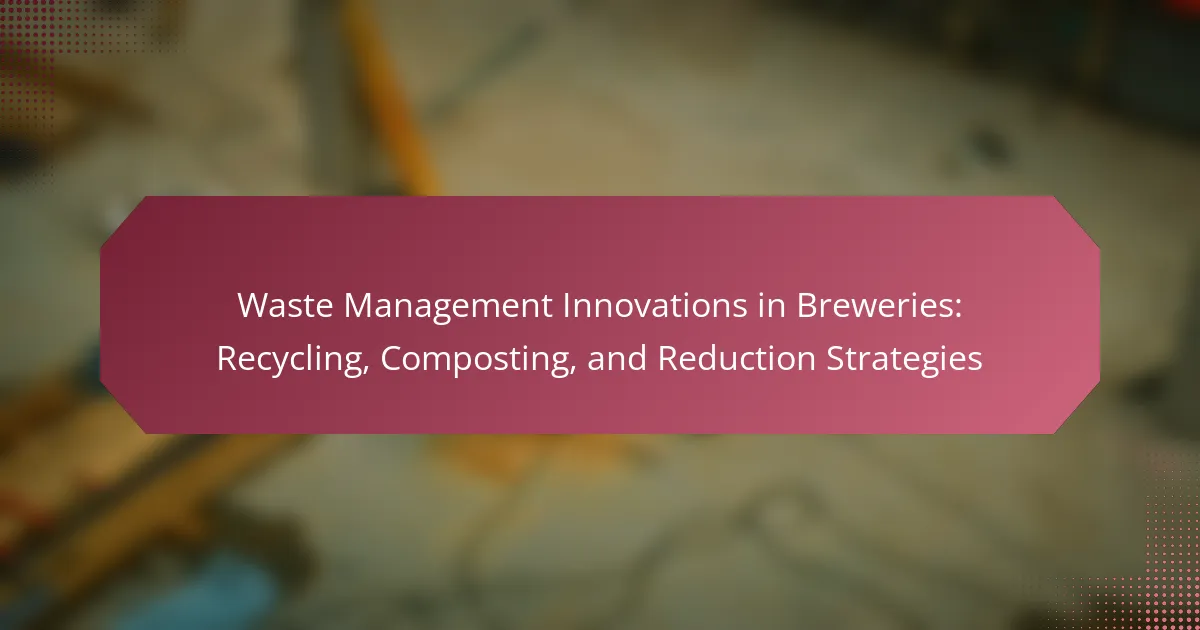Lifecycle Assessment (LCA) in brewing is a systematic evaluation of the environmental impacts associated with brewing activities. This process encompasses all stages, including raw material extraction, production, distribution, and disposal, aiming to identify opportunities for sustainability improvements. Key methods used in LCA include the ISO 14040 series and process-based modeling, alongside software tools like SimaPro and GaBi for data analysis. Implementing LCA can lead to significant reductions in carbon footprint and promote resource efficiency, ultimately benefiting both the environment and brewery operations. The article will cover the methods, benefits, and steps for implementing LCA in the brewing industry.

What is Lifecycle Assessment in Brewing?
Lifecycle Assessment in Brewing is a systematic process for evaluating the environmental impacts of brewing activities. It considers all stages of the brewing process, from raw material extraction to production, distribution, and disposal. This assessment helps identify areas for improvement in sustainability. It quantifies resource use, emissions, and waste generation associated with brewing. Research shows that implementing Lifecycle Assessment can lead to significant reductions in carbon footprint. For example, a study found that optimizing energy use in brewing can decrease greenhouse gas emissions by up to 30%.
How is Lifecycle Assessment defined in the context of brewing?
Lifecycle Assessment in brewing is defined as a systematic process for evaluating the environmental impacts associated with all stages of a beer’s life cycle. This includes raw material extraction, production, distribution, consumption, and disposal. The assessment quantifies energy use, water consumption, and greenhouse gas emissions. It helps breweries identify areas for improvement in sustainability practices. By analyzing these stages, breweries can make informed decisions to reduce their ecological footprint. Research indicates that implementing Lifecycle Assessment can lead to significant resource savings and enhanced operational efficiency.
What are the key stages of the brewing lifecycle?
The key stages of the brewing lifecycle are malting, mashing, boiling, fermenting, conditioning, and packaging. Malting involves soaking grains to allow germination, then drying them. Mashing mixes the malted grains with hot water to extract sugars. Boiling the mixture sterilizes it and adds hops for flavor. Fermenting involves adding yeast to convert sugars into alcohol and carbon dioxide. Conditioning allows the beer to mature and develop flavors. Finally, packaging involves transferring the beer into bottles or kegs for distribution. These stages are essential for producing quality beer and are widely recognized in brewing practices.
How does Lifecycle Assessment differ from other sustainability assessments?
Lifecycle Assessment (LCA) evaluates the environmental impacts of a product throughout its entire life cycle. This includes stages such as raw material extraction, production, distribution, use, and disposal. Unlike other sustainability assessments, LCA provides a comprehensive view by considering all phases of a product’s life. Other assessments may focus on specific aspects, such as carbon footprint or energy use, without a holistic view. LCA quantifies impacts using standardized metrics, allowing for comparability across products. It also identifies opportunities for improvement at each life cycle stage. This thorough approach sets LCA apart from more narrow assessments.
Why is Lifecycle Assessment important for breweries?
Lifecycle Assessment is important for breweries because it evaluates the environmental impacts of brewing processes. This assessment helps identify areas for improvement and resource efficiency. It considers the entire lifecycle, from raw material extraction to waste management. By analyzing these stages, breweries can reduce their carbon footprint. For instance, a study by the American Society of Brewing Chemists found that energy consumption during brewing can be optimized through lifecycle analysis. Implementing these insights leads to cost savings and sustainable practices. Thus, Lifecycle Assessment is crucial for breweries aiming to enhance sustainability and operational efficiency.
What environmental impacts does Lifecycle Assessment address?
Lifecycle Assessment addresses several environmental impacts. It evaluates resource consumption, including water and energy use. It also assesses emissions to air, water, and soil. Waste generation is another critical impact analyzed. Additionally, it examines the ecological effects on biodiversity. Lifecycle Assessment considers the entire product lifecycle, from raw material extraction to disposal. This comprehensive approach helps identify areas for improvement. By quantifying these impacts, businesses can make informed decisions to reduce their environmental footprint.
How does Lifecycle Assessment contribute to regulatory compliance?
Lifecycle Assessment (LCA) contributes to regulatory compliance by providing a systematic evaluation of environmental impacts throughout a product’s life cycle. It helps businesses identify areas where they may not meet regulatory standards. By assessing resource use, emissions, and waste, LCA highlights compliance gaps. Companies can then implement necessary changes to adhere to regulations. Additionally, LCA can support documentation required for environmental certifications. This process ensures that businesses align with both local and international environmental laws. Therefore, LCA is a crucial tool for maintaining regulatory compliance in various industries, including brewing.

What methods are used in Lifecycle Assessment for brewing?
Lifecycle Assessment (LCA) for brewing employs several methods to evaluate environmental impacts. The most common method is the ISO 14040 series, which provides a framework for LCA. This includes defining the goal and scope, inventory analysis, impact assessment, and interpretation. Another method is the use of process-based modeling, which analyzes each brewing stage from raw material sourcing to waste management. Additionally, LCA software tools like SimaPro and GaBi are often utilized for data analysis and impact calculation. These methods help brewers identify areas for improvement and reduce their environmental footprint effectively.
What are the primary methodologies for conducting Lifecycle Assessments?
The primary methodologies for conducting Lifecycle Assessments (LCAs) include the following approaches: the ISO 14040 series, the Environmental Product Declaration (EPD) method, and the GaBi software methodology. The ISO 14040 series provides a standardized framework for conducting LCAs, ensuring consistency and reliability. This series outlines four key phases: goal and scope definition, inventory analysis, impact assessment, and interpretation.
The EPD method focuses on quantifying environmental impacts and communicating them through standardized declarations. This method allows for comparability between products. The GaBi software methodology utilizes advanced modeling techniques to analyze complex product systems. It offers extensive databases for various materials and processes, enhancing accuracy in assessments.
These methodologies have been validated through numerous studies and applications in various industries, including brewing. They provide a systematic approach to evaluate the environmental impacts throughout a product’s lifecycle.
How does the ISO 14040 standard apply to brewing?
The ISO 14040 standard applies to brewing by providing a framework for conducting Life Cycle Assessments (LCAs). This standard outlines the principles and framework necessary for assessing environmental impacts throughout the brewing process. It emphasizes the importance of evaluating resources used, emissions produced, and waste generated at each stage, from raw material sourcing to packaging.
Breweries can use this standard to identify areas for improvement in sustainability. For example, it helps quantify energy consumption and water usage, enabling breweries to implement more efficient practices. The ISO 14040 standard also facilitates comparison between different brewing methods or products by standardizing the assessment process.
Evidence shows that breweries adhering to this standard can achieve significant reductions in their environmental footprint. According to a study published in the Journal of Cleaner Production, breweries implementing LCA methodologies have reduced energy use by up to 30%. This illustrates the practical benefits of applying ISO 14040 in the brewing industry.
What role does data collection play in Lifecycle Assessment?
Data collection is essential in Lifecycle Assessment (LCA) as it provides the necessary information to evaluate environmental impacts. It involves gathering data on resource inputs, emissions, and waste generated throughout a product’s lifecycle. Accurate data collection enables a comprehensive analysis of each stage, from raw material extraction to production, distribution, use, and disposal. This information is crucial for identifying hotspots of environmental impact. Furthermore, it supports decision-making for improving sustainability practices. Studies indicate that thorough data collection can enhance the reliability of LCA results, leading to more informed strategies for reducing ecological footprints.
How can breweries implement Lifecycle Assessment effectively?
Breweries can implement Lifecycle Assessment (LCA) effectively by following a structured approach. First, they should define the goal and scope of the assessment. This includes identifying the specific processes and products to analyze. Next, breweries need to inventory all relevant inputs and outputs associated with the brewing process. This data can include raw materials, energy consumption, water usage, and emissions.
After gathering data, breweries must assess the environmental impacts linked to each stage of the lifecycle. This involves evaluating factors such as carbon footprint and resource depletion. Once the assessment is complete, breweries should interpret the results to identify areas for improvement. This can lead to targeted strategies for reducing environmental impacts.
Lastly, breweries should communicate their findings and improvements to stakeholders. Transparency can enhance brand reputation and consumer trust. Research shows that implementing LCA can lead to significant sustainability gains in the brewing industry. For example, a study published in the Journal of Cleaner Production highlights that breweries adopting LCA practices can reduce their carbon emissions by up to 20%.
What tools and software are available for conducting assessments?
Tools and software available for conducting assessments include SimaPro, OpenLCA, and GaBi. SimaPro offers comprehensive lifecycle assessment capabilities. It supports various databases for accurate environmental impact analysis. OpenLCA is an open-source software that allows for flexible modeling of systems. It provides access to multiple databases and is user-friendly. GaBi is known for its robust data management and reporting features. It is widely used in industry for detailed assessments. These tools facilitate effective evaluation of environmental impacts in brewing processes.
How can breweries integrate findings into their operations?
Breweries can integrate findings into their operations by adopting lifecycle assessment (LCA) methodologies. LCA helps breweries evaluate the environmental impacts of their processes. By analyzing each stage from raw material sourcing to distribution, breweries can identify inefficiencies. Implementing changes based on LCA findings can reduce waste and energy consumption. For instance, breweries may switch to renewable energy sources. They can also optimize water usage in brewing and cleaning processes. Studies show that breweries using LCA reduce their carbon footprint significantly. This integration leads to better sustainability practices and cost savings.

What benefits does Lifecycle Assessment provide to breweries?
Lifecycle Assessment (LCA) provides breweries with a systematic approach to evaluate environmental impacts. It helps identify areas for improvement in resource efficiency. By analyzing the entire lifecycle, from raw materials to waste, breweries can reduce their carbon footprint. LCA promotes sustainable practices that can lead to cost savings. For instance, optimizing energy use during production can lower operational costs. It also enhances product quality by ensuring sustainable sourcing of ingredients. Furthermore, LCA supports compliance with environmental regulations. This can improve a brewery’s reputation among eco-conscious consumers. Overall, LCA empowers breweries to make informed decisions that benefit both the environment and their business.
How does Lifecycle Assessment enhance operational efficiency?
Lifecycle Assessment (LCA) enhances operational efficiency by identifying areas for resource optimization. It evaluates the environmental impacts of brewing processes from raw material extraction to disposal. By analyzing energy and water usage, LCA helps breweries reduce waste and improve sustainability.
For example, a study by the American Society of Brewing Chemists found that breweries implementing LCA reduced energy consumption by up to 20%. This reduction leads to lower operational costs and improved profitability. Additionally, LCA fosters innovation by encouraging the adoption of more efficient technologies and practices.
Overall, LCA provides a comprehensive framework for breweries to enhance their operational efficiency through informed decision-making.
What cost savings can be realized through Lifecycle Assessment?
Cost savings through Lifecycle Assessment (LCA) can be significant for brewing operations. LCA identifies inefficiencies in resource usage and waste management. By analyzing the entire lifecycle, brewers can optimize processes and reduce energy consumption. For example, a study found that implementing LCA can lead to a 20% reduction in water usage. Additionally, LCA helps in selecting sustainable materials, which can lower procurement costs. The identification of potential areas for recycling can also minimize disposal expenses. Overall, LCA provides a framework for continuous improvement, leading to long-term financial benefits for breweries.
How does Lifecycle Assessment improve product quality?
Lifecycle Assessment (LCA) improves product quality by identifying areas for enhancement throughout a product’s life cycle. LCA evaluates environmental impacts from raw material extraction to disposal. This comprehensive view allows manufacturers to pinpoint inefficiencies and areas for improvement. By addressing these issues, companies can enhance product durability and performance. For example, a study found that optimizing resource use can lead to a 20% reduction in waste. This reduction not only improves environmental impact but also enhances product quality. Additionally, LCA fosters innovation by encouraging the development of sustainable materials. Sustainable materials often lead to superior product attributes, such as increased strength or reduced toxicity. Thus, LCA plays a crucial role in driving product quality improvements in manufacturing processes.
What are the social benefits of conducting Lifecycle Assessments?
Lifecycle Assessments (LCAs) provide significant social benefits by promoting sustainability and enhancing community well-being. They encourage companies to adopt environmentally friendly practices. This leads to improved public health outcomes by reducing pollution and resource depletion. LCAs also foster transparency in production processes. This transparency builds consumer trust and encourages informed purchasing decisions. Additionally, LCAs can stimulate local economies by identifying sustainable sourcing options. They help create jobs in green technologies and sustainable practices. Furthermore, LCAs can enhance corporate social responsibility initiatives, benefiting communities through social investment. Overall, LCAs contribute to a more sustainable and equitable society.
How does Lifecycle Assessment promote community engagement?
Lifecycle Assessment (LCA) promotes community engagement by involving stakeholders in sustainability discussions. It provides a framework for assessing environmental impacts throughout a product’s lifecycle. This transparency fosters collaboration between businesses, consumers, and local communities. Engaging the community helps identify local environmental concerns and priorities. Stakeholders can contribute insights that enhance the assessment process. Research shows that inclusive LCA practices lead to stronger community ties and increased public awareness. For instance, studies indicate that community-driven LCAs result in more relevant sustainability initiatives. These initiatives often align closely with community values and needs. Overall, LCA serves as a tool for building relationships and promoting shared responsibility in sustainability efforts.
What role does Lifecycle Assessment play in corporate social responsibility?
Lifecycle Assessment (LCA) plays a crucial role in corporate social responsibility (CSR) by evaluating the environmental impacts of products throughout their lifecycle. LCA helps companies identify areas for improvement in sustainability. It provides a systematic approach to assess resource use, emissions, and waste generation. By understanding these factors, businesses can make informed decisions to reduce their ecological footprint. Furthermore, LCA supports transparency and accountability in corporate practices. Companies that adopt LCA demonstrate their commitment to sustainable practices. This can enhance brand reputation and customer loyalty. Studies show that organizations integrating LCA into their CSR strategies often achieve better compliance with environmental regulations.
What are the best practices for conducting Lifecycle Assessments in brewing?
Best practices for conducting Lifecycle Assessments (LCA) in brewing include defining the goal and scope clearly. This involves identifying the specific objectives of the assessment. It is essential to create a detailed inventory of inputs and outputs throughout the brewing process. Accurate data collection is crucial for reliable results.
Engaging stakeholders during the assessment ensures comprehensive input and validation of findings. Utilizing established LCA frameworks, such as ISO 14040, guides the methodology. Analyzing the results using appropriate impact assessment methods helps in understanding environmental effects.
Finally, documenting the entire process transparently allows for reproducibility and peer review. These practices promote accuracy and credibility in the lifecycle assessment of brewing operations.
Lifecycle Assessment (LCA) in brewing is a systematic process that evaluates the environmental impacts of brewing activities across all stages, from raw material extraction to disposal. This article outlines the definition, key stages, and methodologies of LCA, highlighting its importance for breweries in identifying areas for sustainability improvement and operational efficiency. It also discusses the benefits of implementing LCA, including cost savings, enhanced product quality, and contributions to corporate social responsibility. Furthermore, best practices for effective implementation of LCA in brewing are provided, emphasizing the role of data collection and stakeholder engagement in achieving meaningful results.



